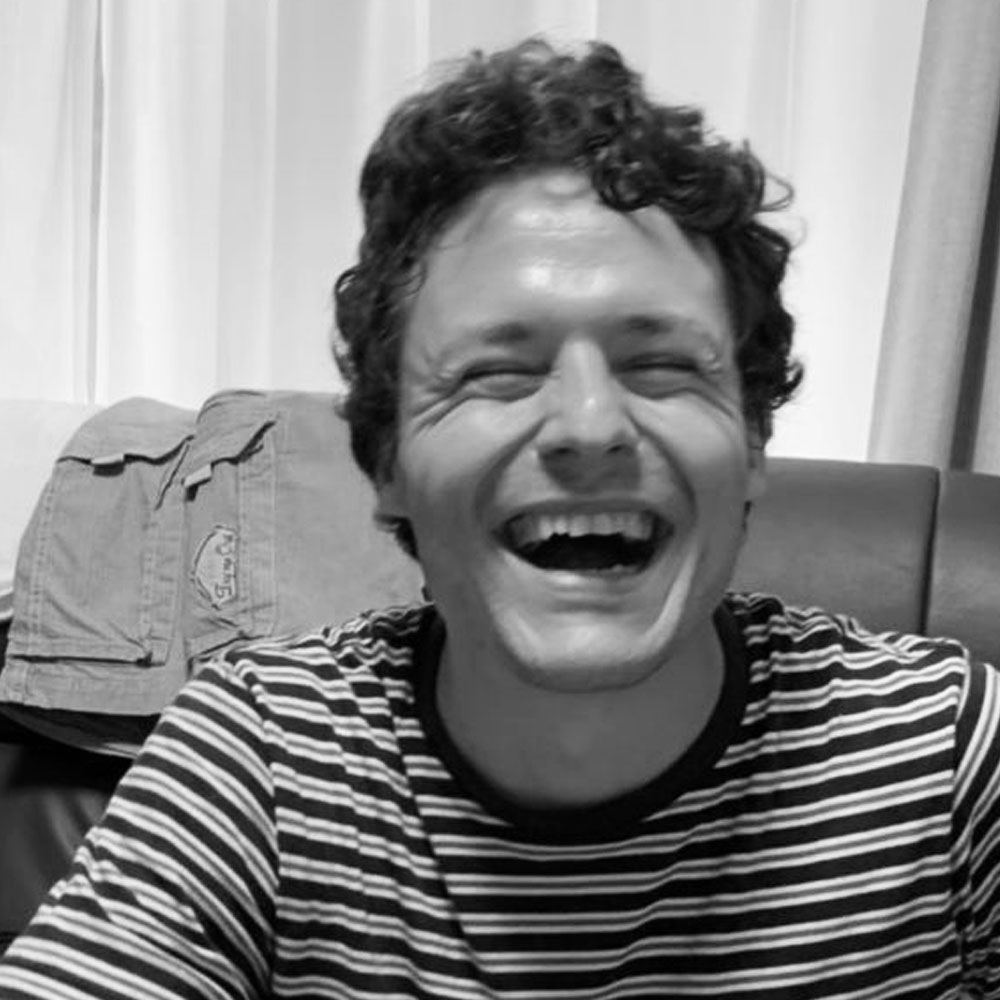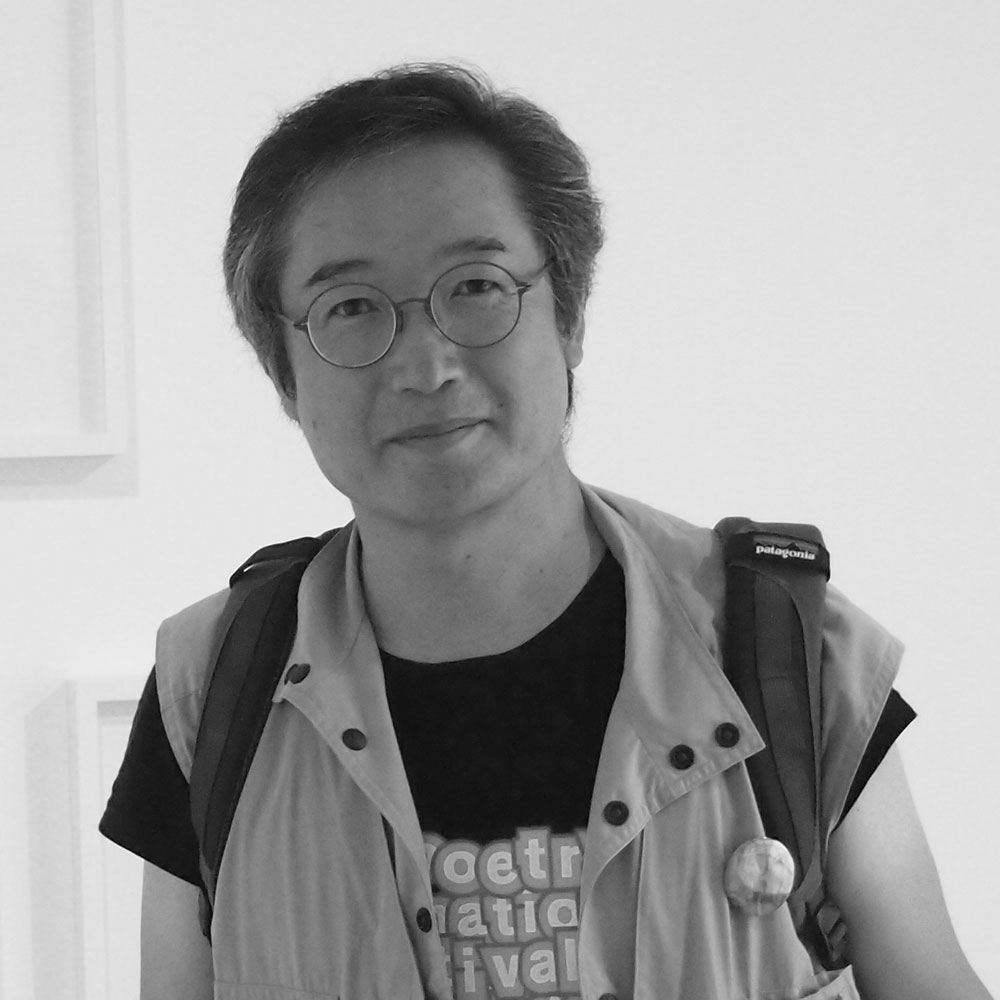Online (Live from Tokyo)
A recording of this event is available below
Date & Time
7pm in Tokyo / 10am London (UTC)
Saturday 12th December 2020

István Zardai
Philosopher

Yasuhiro Yotsumoto
Poet

Shoko Kinoshita
Translator
The first of our events to take place in a virtual setting, poet Yasuhiro Yotsumoto and philosopher Istvan Zardai hosted their conversation through Zoom.
The discussion covers a number of topics connected to the central theme of ‘Instinct’ in Midgley's work including “Beast and Man” and “Science and Poetry”, with audience joining the conversation from around the globe.
The conversation is accompanied by the release of an electronic volume. A booklet containing Yasuhiro's and Istvan's letters exchanged in preparation for the event, and a cycle of Yasuhiro's poems prompted by Midgley's work. Download this booklet (in English) in the right hand column of this page.
https://www.youtube.com/watch?v=LT2zVC63FX0&feature=youtu.be
For more Biscuit Tin content follow us on Instagram:
Instagram @notesfromabiscuittin
The Biscuit Tin is now in lockdown in Tokyo and will carry on with its journey when it is safe. In the meantime our philosophers are reflecting on what we can learn from Midgley's writings during this time of Covid. Their reflections show how Midgley's thought can help us to make sense of this crisis and to navigate in an uncertain environmental and political future.
What would Midgley have thought about the current COVID crisis? Would she have thought that this is an occasion that calls for her engagement as a philosopher, or rather for her organisational and political side?
I find Midgley’s approach overall community oriented, encouraging us to take an active stance on social issues and to pursue practical action to bring about change. Because of this, she would not have been satisfied with simply writing about the many leadership failures and other issues that the pandemic placed into the spotlight. She would have been angry and active.
The world is in a strange state at the moment. While the US is still the strongest political force, China is catching up fast, and countries like France, the UK, or Italy, which have been leading economies and military powers for a long time, are now eclipsed by India, and soon Brazil, Indonesia, and others will catch up to them too. The insecurity caused by these shifts, felt across diplomacy, finance, media, and other fields, led people in many countries to vote for leaders who are stunningly self-confident and promise quick fixes to all problems. These leaders showed a striking lack of concern for the public, and little in terms of leadership qualities, while trying very hard to appear busy and efficient. They relied on their marketing strategies, which quickly turned out to be irrelevant. Their simplistic mantras of increasing productivity, growing the economy, and replacing public services with private businesses also proved to be doing more harm than good. Their incompetency led to several catastrophic decisions, while they ignored their advisors, and were careless with complex facts and data, hijacking public discussions towards fruitless points. Since Midgley emphasised the benefits of scientific advances throughout her writings and the importance of careful thinking, I think she would have been appalled and written about the lack of respect for expert opinion that such leaders have shown.
During our work for the Notes from the Biscuit Tin Project’s Tokyo event, Yasuhiro Yotsumoto and I explored Midgley’s ideas on beastliness, the instinctive side of human nature, and the role that poetry can play in inspiring society. Midgley thought that scientific and technological thinking has its limits, and it cannot provide the inspiration and cohesive vision about how to live life as a community that our societies need. During the crisis some journalists and researchers attempted to inspire people and to sketch alternative economic plans, new approaches to protecting the environment and preventing global warming. Most of these attempts failed to reach and to convince masses of people. And so far, there has been no notable, widely shared imaginative proposal about how humanity could continue sustainably in the long term. This is where imagination and irrationality could shine: irrationality, in the sense of putting our instinctive collaborative and caring behavior first, instead of our instrumental goals like propping up the economy.
Another aspect of public discussions that I think Midgley would have been outraged by and certainly addressed, is how notions of beastliness came to the fore again. I’m not just talking about the blanket racism that many have shown. Rather, I have in mind the proposals that all bats should be culled. It is true that bats carry several dangerous viruses, many of which can be transferred to humans. Does this call for more attention and research on this issue, and for better hygiene, regulation and education regarding living and working in areas where bats are prevalent? Yes. Does it call for the extermination of all bats? Most likely not. Throughout thousands of years we have evaded massive scale infections despite the fact that we farm and rear animals near bat populations.
In her ‘The Concept of Beastliness’ Midgley showed how throughout our intellectual and cultural history humans have often defined themselves in contrast with animals, relegating all negative aspects of our nature – greed, excess, selfish aggression, and so on – to our beastly sides, and defined humanity in terms of our supposedly most excellent features, like conscious thinking and planning, or rule following. This is a very misleading picture as Midgley argued: the lives of most animals follow fairly fixed patterns, they are regulated by a large number of interacting instincts, displaying an important but limited flexibility. The same is not true of humans. Humans have certain abilities, like conceptual thought, which are fairly unique at this level of development. They enable us to act in more flexible ways, varying the patterns of our lives greatly. This seems to be one of the reasons why, despite being social animals for whom caring for others is essential, we can create institutions like social care, pension or healthcare, while others can engage in corruption, crimes, and do other bad things knowing fully well what they are doing.
Blaming bats for the disease is an interesting manifestation of the wish to ‘outsource’ our responsibility to handle animals and food, as well as other people, with care. It is also a radical proposal, which masks the many evils committed by humans that made the current global situation much worse than it should have been. If the first Chinese doctors who noticed the spread of the disease would not have been silenced by the Communist Party leadership, if Trump would not have downplayed expert opinions and encouraged US citizens to put their momentary preferences over the interests of communities, if healthcare would be properly resourced in Italy, Brazil, Russia, and other places, if Johnson would have understood the basic idea of flattening the curve before going public with his ideas, if Bolsanaro would have cared more about preparing Brazil for the surge of infections rather than waging a war on evidence…
These were all failures leading to the current dire situation. At the moment of writing this we can count more than 6 million cases and almost 400,000 deaths. This is evidence that unlike animals, humans are capable of being uncaring, of disregarding evidence, and of being evil. With severely overworked doctors, nurses and other essential workers, and no vaccine but at least two more waves of infections in sight, I think Midgley would stress two things. First, that evil is real and some people need to be pulled up and held responsible. Pointing to beasts or our animal nature provides no excuses. Second, that we need much higher quality plans for the future than what we have now. The visions that got our self-promoting, loud leaders elected do not address any of the important issues we will certainty face in the near future. The largest economies and armies are not worth much, when they don’t protect and serve our communities. How could we believe that these celebrity leaders will show us the way out of the bigger troubles of global warming, of increasing military tensions, or of rapidly growing inequality?
It might be time to pay more attention to poets and others who are willing to shake things up in creative, constructive and fresh ways.
That’s some of what I imagine Midgley would want to say.
István Zardai, June 2020
 image courtesy of Markus Spiske
image courtesy of Markus Spiske
István Zoltan Zardai
István Zoltan Zardai is a philosopher currently working and living in Japan. He completed his BA and MA studies in Hungary at the University of Pecs, and his PhD in the UK at Oxford Brookes and at Hertfordshire University, under the supervision of Prof Constantine Sandis. István works mainly on philosophy of action and agency, and connected topics in ethics, moral psychology, and the philosophy of AI. Following his PhD he was a teacher and an administrator in higher education, and most recently a postdoc research fellow at Keio University, Tokyo with a grant from the Japan Society for the Promotion of Science. He is also a contributor to Dr Tamas Demeter's project 'Morals and Values in Modern Science'.
Yasuhiro Yotsumoto
Born 1959. So far published 13 books of poetry including A Laughing Bug (1991), The World Congress of Middle Aged (2002 Yamamoto Kenichi Award), Afternoon of Forbidden Words, (2003 Hagiwara Sakutaro Award), Prisoner of Japanese (2012 Ayukawa Nobuo Award), Drip Drop Monotony, Sloppily, Wildly (2017) and Novel (2017). English translations include Family Room and Poems of MINASHITA KIRYU, YOTSUMOTO YASUHIRO & SOH SAKON (both from VagabondPress).
Published two full length novels, The Fake Poet (2015), and The Song Diary of a Prostate Gland (2018), which followed the classic style of combining verses and proses.
Yasuhiro is also active in the areas of translation (Kid by Simon Armitage) and literary criticism (Shuntarology, a thesis on the poetics of Shuntaro Tanikawa and the collected essays To Dear Poets! )
Since 2006, Yasuhiro has been Japanese national editor of Poetry International Web, introducing contemporary Japanese poetry through English translations. He is also on editorial board for the poetry magazine Beagle in Japan. Yasuhiro has been away from Japan since 1986 and living in Munich, Germany for the past 25 years.
Shoko Kinoshita
Shoko Kinoshita is a part-time lecturer at Keio University (Japan). She mainly studies the philosophy of language, with additional interests in social ontology and metaphilosophy. She translated Theodore Gracyck’s On Music (with Tohru Genka, Keio University Press, 2019) into Japanese and is currently working on translating essays on feminist philosophy.
Theme
Instinct
Reading
Concept of Beastliness: Philosophy, Ethics and Animal Behaviour
Philosophy, vol. 48 (1973), pp. 111-135
